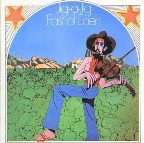During the 1950s & 60s, tons of instrumental tracks made the UK chart, but by the early 70s, they were few and far between, in fact the only instrumental number one of the 70s came in 1973 with Simon Park spending four weeks at the top with Eye Level. This was also the last truly instrumental chart topper. Fortunately in the following three decades quality lyric-less songs made the chart and one such was the violin-led Jig-A-Jig by prog rock band East Of Eden.
If you only know the one track by East Of Eden, then you probably wouldn’t have guessed they were a prog rock band. They formed in Bristol in 1967, originally as Pictures of Dorian Gray, by Dave Arbus who played violin, flute, saxophone and trumpet. He enlisted the services of alto sax player Ron Caines, guitarist Geoff Nicholson, bass player Mike Price and drummer Stuart Rossiter but over the next three years there were to be various personnel changes. The last to leave was Nicholson who was replaced by Davey ‘Crabsticks’ Trotter on Mellotron which added a new angle to their trademark sound.
Their debut album, Mercator Projected was released in 1969 but failed to attract buyers. Their second album, Snafu had more of a jazz feel as it featured Charles Mingus and John Coltrane influenced tracks. The first single from it was Jig-A-Jig which was the encore number in their set, an ironic throwaway twist to the rest of their show. Dave Arbus recalled how it came about, “”At the end of a show one night I launched into some jigs and the band followed me. It was quite spontaneous, the audience went wild. It became our finale. We probably invented Celtic rock by accident,” he explained in Mojo magazine in 2010. “We’d been listening to a lot of Frank Zappa & the Mothers Of Invention and that told us that we could do anything we wanted.”
Although a big encore number it failed to chart. The follow-up was Ramadhan which also failed to chart but did reach number two in France in 1970. On the strength of this, their record company, Deram, decided to re-release Jig-A-Jig which second time round did make an impression across Europe.
“The song drew a new audience for the band,” Arbus continued. “A lot of people came to shows and didn’t realise what kind of band we were and we weren’t clear who our audience were any longer. We were serious about what we wanted to do, but the record company wanted a follow-up. We were at a loss what to do. We were an albums group, I think it destroyed us.”
A further two albums followed, East Of Eden and New Leaf both in 1971. The next four albums Another Eden (1975), Here We Go Again (1976), It’s The Climate (1976) and Silver Park (1978) were all Europe-only releases. The band split in 1978. The three core members Arbus, Caines and Nicholson reunited in 1996 and have concentrated on playing mainly jazz based instrumental material. “Looking back at it, I’m still very fond of Jig-A-Jig but I wish we had more help in presenting ourselves as we were,” Arbus remembered.
Dave Arbus has one other big claim to fame and as a close friend of the Who’s Keith Moon he was invited to play the violin on the much loved Baba O’Reilly. In 1978 he formed another group called Fiddler’s Dram with singer Cathy LeSurf, Alan Prosser, Chris Taylor and Ian Telfer but left before they had their one and only UK hit Daytrip To Bangor in 1979.
